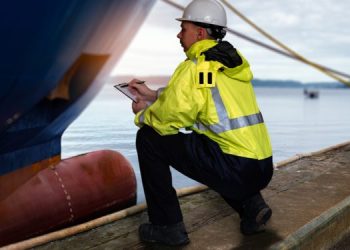Capt. Panagiotis Nikiteas, HSQE Manager / DPA / CSO, Anangel Maritime Services Inc, examines whether the PSC regime has served its purpose and all industry stakeholders have played their role effectively, highlighting that co-operation of all stakeholders and valuable ‘safety nets’, such as proper and ethical PSC inspections, are required.
Many still think or say that the various Memoranda of Understanding (MOU) on Port State Control (PSC) is a gloomy sounding phenomenon. However, maybe is not such a gloomy affair after all.
Researching the history of Port State Control, it is noted that it is not really new. Even the first International Convention for the Safety of Life at Sea that was adopted in 1914, already contained a provision necessitating the control of ships while in ports of Contracting Governments. There-after, IMO has issued several Assembly Resolutions pertaining to Port State Control making matter well regulated.
As it is known vessels are controlled from the day-one of their creation, i.e. from the very date of their keel-laying date. The Flag States exercise control through ratified and additional regulations, some even do inspections; Recognized Organizations (ROs) set rules, approve designs and plans, monitor construction and perform surveys and audits; underwriters also survey their ships. Common purpose of these functions was, is and will be the eradication of substandard ships and the protection of seafarers’ lives and the marine environment.
In the chain of responsibility, ultimately responsible for the safety of a vessel at sea remains the shipowner and the appointed management company.
However, accidents still occur resulting in losses of lives, property and environmental damage, due to, among other reasons, improper maintenance, reduced expenditure, lack of competent manpower ashore and onboard, risk-prone approach and non-compliance with international and industry safety standards. It is clear that some Flag States, ROs, Owners, Managers etc fail to fulfill their commitments.
It is evident that the snapshots yearly, or so, inspections or surveys provide, were / are not sufficient. MOUs on PSC aim to provide another strong line of defence, a safety net, in order to preserve safety, security, property and environment through targeting sub-standard shipping and reducing / eliminating unsafe conditions.
Is it also true that certain PSC regimes or inspections conduct is often hindered? Yes; issues such as corruption, misconduct, misbehavior, communication gaps, inexperienced inspectors, etc. Well, when we consider that $1.5 trillion are paid in bribes each year world-wide, shipping is a mutli-cultural/multi-language industry, the lack of highly skilled and competent workforce, it would be utopian to reflect that shipping and PSC regimes could remain unaffected.
Overall though improvements are notable and commendable in terms of transparency, recording, reporting, conduct practices, supervision by central organizations such as EMSA, but most of all in the fighting of substandard shipping through imposition of restrictions (reactive to inspections) and cultivation of a culture pushing for actions “before PSC finds it” (proactive to inspections).
Where the seafarer of any rank stands in this situation? He / she certainly should stand fully in favor and in support of any and all actions that make his / her service safer, despite possible inconveniences and additional efforts. PSC is and should be our ally in the continual effort for improvement.
And where the prudent shipowner / manager stands? Also should take the same approach, be appreciative of the ethical work and results of PSC regimes, assist and cooperate. The benefits are two-fold, safer ships and less unscrupulous owners running substandard ships, thus no unfair competition.
It is evident that in order to have an effective lasting solution to ship safety concerns, co-operation of all participants in the international shipping industry is required. The IMO, Flag States, Port States, Recognized Organizations, shipowners, managers, crews, insurance underwriters, charterers, ship financiers and cargo owners all need to participate to have safer ships and cleaner oceans. Valuable “safety nets” such as proper and ethical PSC inspections should be supported by all.
By Capt. Panagiotis Nikiteas, HSQE Manager / DPA / CSO, Anangel Maritime Services Inc
The views presented hereabove are only those of the author and not necessarily those of SAFETY4SEA and are for information sharing and discussion purposes only.
[divider]
 Captain Panagiotis Nikiteas is maritime professional with 29 years’ experience span in various sectors of the maritime industry including management, marine, vetting, operations, crewing, safety, quality, environmental, energy, security, health, surveying, incident investigation and training. He had been stationed and worked abroad in Manila, Dubai and Singapore and appreciated the benefits of multi-cultural working environment. He is holding Master’s Degree in Adult Education, Master’s degree in International Shipping with distinction, Post Graduate Diploma in International Shipping and Transport Management and is a graduate form Hydra Merchant Marine Academy with distinction. Panagiotis is the HSQE Manager / DPA / CSO of Anangel Maritime Services Inc.
Captain Panagiotis Nikiteas is maritime professional with 29 years’ experience span in various sectors of the maritime industry including management, marine, vetting, operations, crewing, safety, quality, environmental, energy, security, health, surveying, incident investigation and training. He had been stationed and worked abroad in Manila, Dubai and Singapore and appreciated the benefits of multi-cultural working environment. He is holding Master’s Degree in Adult Education, Master’s degree in International Shipping with distinction, Post Graduate Diploma in International Shipping and Transport Management and is a graduate form Hydra Merchant Marine Academy with distinction. Panagiotis is the HSQE Manager / DPA / CSO of Anangel Maritime Services Inc.




























































